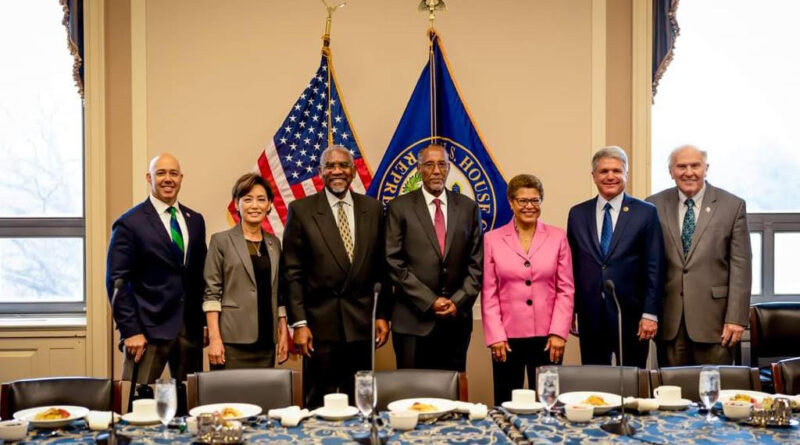Democratic, self-governing Somaliland pleads with U.S. to recognize independence
Washington, DC—Somaliland President Muse Bihi Abdi spent the past week in Washington making the case that the U.S. should become the first country to recognize his self-declared state’s independence — and he’s leaving with some positive signals to show for it.
Why it matters: Somaliland has governed itself for three decades but is recognized internationally and by the U.S. as part of Somalia, a position the State Department reaffirmed this week. Unlike the remainder of Somalia and most of its neighbors on the Horn of Africa, though, it’s democratic and relatively secure.
- “We know that for the sake of international diplomacy, they will not recognize Somaliland tomorrow,” Bihi told Axios in an interview. “So the question is, below that, how to deepen engagement between the governments.”
- In meetings with Biden administration officials, Bihi proposed that the U.S. open a diplomatic office in the capital, Hargeisa. Six other countries including the U.K. have such offices. The conversations were “very positive” but ended without concrete commitments, Bihi said.
- Bihi noted in our interview that his country would be a willing security partner for the U.S. and had recently signed a cooperation agreement with Taiwan (that made Chinese officials “a little bit angry with us,” he told me).
Somaliland’s democratic bona fides and location in an area where the U.S. is competing with China for influence did not go unnoticed on Capitol Hill.
- Rep. Michael McCaul (R-Texas), ranking member on the House Foreign Affairs Committee, which hosted Bihi, told Axios it was “urgent” that the U.S. increase its engagement with Somaliland, starting with a diplomatic presence in Hargeisa and direct development aid to the government.
- Such steps would counter Russian and Chinese influence, “reinforce support for Taiwan, and embolden democracy advocates worldwide,” McCaul said.
- Another House Republican, Scott Perry (R-Pa.), went further by introducing a bill to recognize Somaliland’s independence, though it’s unlikely to pass anytime soon.
Somaliland’s independence push is opposed by the African Union, with members fearing that it could further destabilize Somalia and embolden separatists elsewhere.
- While the circumstances of South Sudan’s independence in 2011 were far different, the country’s trajectory since then is another source of pessimism.
- Bihi argues that every country on the map had to gain independence at some point, and Somaliland is no different.
- He says he’s working to strengthen relations with every country except one: the current government in Mogadishu. “We see it as the No. 1 enemy of Somaliland,” he said, and “have absolutely no relations with them.”
- Bihi said nine rounds of peace talks with previous Somali governments went nowhere and there is no point in future dialogue, though “we have no war with them.
Somaliland President Muse Bihi Abdi spent the past week in Washington making the case that the U.S. should become the first country to recognize his self-declared state’s independence — and he’s leaving with some positive signals to show for it.
Why it matters: Somaliland has governed itself for three decades but is recognized internationally and by the U.S. as part of Somalia, a position the State Department reaffirmed this week. Unlike the remainder of Somalia and most of its neighbors on the Horn of Africa, though, it’s democratic and relatively secure.
- “We know that for the sake of international diplomacy, they will not recognize Somaliland tomorrow,” Bihi told Axios in an interview. “So the question is, below that, how to deepen engagement between the governments.”
- In meetings with Biden administration officials, Bihi proposed that the U.S. open a diplomatic office in the capital, Hargeisa. Six other countries including the U.K. have such offices. The conversations were “very positive” but ended without concrete commitments, Bihi said.
- Bihi noted in our interview that his country would be a willing security partner for the U.S. and had recently signed a cooperation agreement with Taiwan (that made Chinese officials “a little bit angry with us,” he told me).
Somaliland’s democratic bona fides and location in an area where the U.S. is competing with China for influence did not go unnoticed on Capitol Hill.
- Rep. Michael McCaul (R-Texas), ranking member on the House Foreign Affairs Committee, which hosted Bihi, told Axios it was “urgent” that the U.S. increase its engagement with Somaliland, starting with a diplomatic presence in Hargeisa and direct development aid to the government.
- Such steps would counter Russian and Chinese influence, “reinforce support for Taiwan, and embolden democracy advocates worldwide,” McCaul said.
- Another House Republican, Scott Perry (R-Pa.), went further by introducing a bill to recognize Somaliland’s independence, though it’s unlikely to pass anytime soon.
Somaliland’s independence push is opposed by the African Union, with members fearing that it could further destabilize Somalia and embolden separatists elsewhere.
- While the circumstances of South Sudan’s independence in 2011 were far different, the country’s trajectory since then is another source of pessimism.
- Bihi argues that every country on the map had to gain independence at some point, and Somaliland is no different.
- He says he’s working to strengthen relations with every country except one: the current government in Mogadishu. “We see it as the No. 1 enemy of Somaliland,” he said, and “have absolutely no relations with them.”
- Bihi said nine rounds of peace talks with previous Somali governments went nowhere and there is no point in future dialogue, though “we have no war with them.”
Axios

